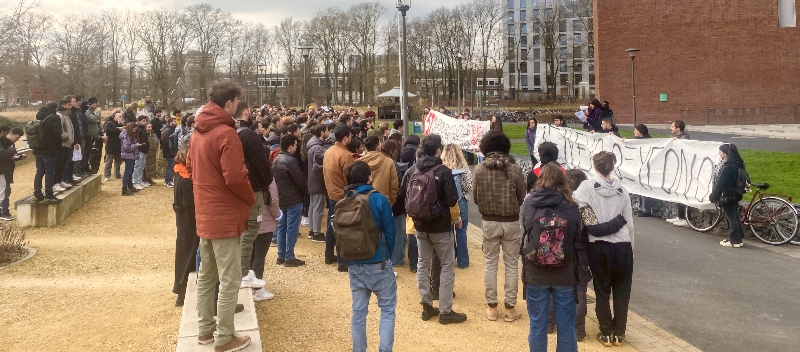Text Youssef el Khattabi
WUR is incredibly diverse, with hundreds of internationals working and studying here. In the Meanwhile In column, we ask one of them to comment on events in their home country. This time we hear from Cédric Baron (30), a Master’s student in Geo-Information Science from France, on the dissolution of the French parliament.
Baron: ‘The dissolution of the French parliament by President Macron was quite a shock for us. I am deeply concerned about the implications of this decision and the potential rise of the far-right National Rally party. In the last parliamentary elections, President Emmanuel Macron’s party failed to achieve a majority, despite securing the most seats. This outcome has forced Macron to consider collaborating with right-wing parties, which goes against his preferred governing style. I feel that he is quite controlling and he often makes decisions that contradict the government’s recommendations. While this situation was not ideal, it is not unprecedented in French politics and with more effort and communication it could have worked out.
‘Because of this dissolution, we have elections at the end of June. This is generating significant media attention, and voter turnout is expected to increase from the typical 50 per cent in parliamentary elections to around 70 per cent. What’s particularly noteworthy is the shifting political landscape. The traditional right is losing ground, and some factions are considering alliances with Le Pen’s National Rally party. It’s remarkable how many people no longer see them as a far-right party, but rather as a mainstream conservative group. A key aspect of their strategy has been to project a more moderate image, even if they are still very radical internally.
‘I’m particularly concerned about their position on climate change. They stand firmly against the European Green Deal and any regulations designed to reduce emissions if such measures impact citizens’ daily lives. For instance, they want France to opt out of the EU ban on new petrol cars by 2035. This stance is alarming, especially considering we’re already witnessing the effects of a 1.5°C increase in global temperature and the associated severe risks.
‘I think that Macron’s move will backfire, and could potentially lead to a far-right absolute majority in parliament. This would be unprecedented for a founding EU country. It could bring significant changes to France’s domestic policies, including a redefinition of citizenship based on blood and tougher restrictions on visas and citizenship acceptance criteria. As someone in a relationship with a non-European, this impacts my future plans.’




